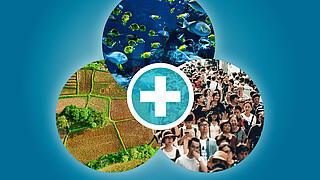In the face of global challenges such as world hunger, the increasing prevalence of overweight and obesity, and the demand for animal welfare, it is clear that food is about much more than just the individual choice of what ends up on our plates. Food is an issue that reaches deep into the areas of health, environmental protection and ethics.
More than a billion people worldwide are starving and thousands die of malnutrition every day. The causes are manifold and include climate change, environmental degradation, wars, corruption, unfair terms of trade, poverty and a lack of ownership and usage rights for land. Environmental, economic and socio-political factors are constantly interacting. The interdependency of these different areas and the links between zoonotic diseases (that are transmitted from animals to humans), environmental damage and human health are also becoming apparent in global crises such as the COVID-19 pandemic and climate change. The One Health approach highlights this close connection between the health of humans, animals and the environment and emphasises a holistic perspective. This is evident, for example, in the way we deal with farm animals. Animal welfare standards are often not adequately implemented, leading to unnecessary suffering. Agriculture that is oriented towards animal welfare not only promotes the wellbeing of animals, but also encourages more sustainable practices and a better food supply for humans.
The responsibility for ensuring that everyone has access to sufficient, healthy and ethically acceptable food is complex, context-dependent and concerns individual decisions as well as social and state actors and framework conditions.




